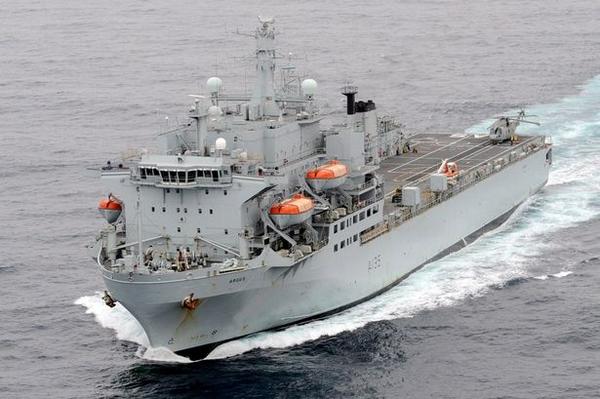A British navy ship was preparing to leave Friday for Sierra Leone laden with personnel, aid and equipment to treat people infected with the Ebola virus.
The RFA Argus, docked in Falmouth, was waiting for high tide before departing on the 10-day journey, stopping at Gibraltar en route to pick up more supplies.
The civilian-staffed military medical support ship will carry materials to build medical units and help keep them supplied. Some 80 medics and 80 marines are among the 350 people on board.
It will travel with three Merlin utility helicopters, air crew and engineers to provide transport and support to medical teams and aid workers.
Troops with landing craft will escort personnel ashore and protect teams deployed on the ground.
While the ship is equipped as a “floating hospital”, Ebola patients will not be brought aboard, and any member of the ship’s company thought to have come into contact with victims would be sent to treatment facilities onshore.
The ship could be stationed off west Africa for three months.
Britain is taking the international lead role in tackling Ebola in Sierra Leone due to its historic links. Sierra Leone gained independence from Britain in 1961.
But Britain’s International Development Secretary Justine Greening said other nations needed to pull their weight in the region.
A British army medical team arrived in Sierra Leone on Thursday to work at a British-supported treatment centre.
Screening at British airports for arrivals from the worst-affected region will be extended to two further airports, the government said Friday.
The scheme, in place at London Heathrow and, after implementation at London Gatwick by the end of next week, will also be extended to Manchester and Birmingham.
Meanwhile British pharmaceutical group GlaxoSmithKline, which is seeking to develop an Ebola vaccine, warned that one was unlikely to be available during the current outbreak.
Ripley Ballou, GSK’s head of Ebola vaccine research, told BBC radio: “To have a vaccine that people can use, you have to have the vaccine registered and it has to be manufactured on a scale that is consistent with the intended use.

COMMENTS
Please let us know if you're having issues with commenting.